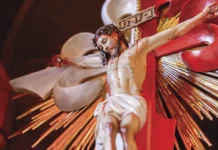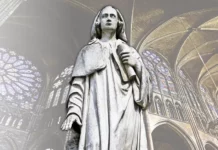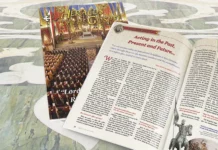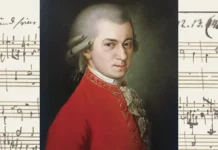This month, history celebrates the 500th anniversary of the death of Josquin des Prez, an illustrious Franco-Flemish composer who, through his music, recalled that art is an instrument in human hands for the glory of God.
A midst the Carrara marble and Michelangelo’s frescoes, the Sistine Chapel hides a lesser-known treasure. It is a discreet gem, rendered not in fine paint but in rustic graphite. Its lines have nothing of Raphael’s elegant panels or Bernini’s monumental designs.
It is a simple signature: Josquini.
Not infrequently, restorers of Vatican interiors find signatures of this kind, for between the fifteenth and eighteenth centuries papal cantors used to engrave their names on these walls. Many scholars think it is quite reasonable to attribute it to Josquin des Prez.1
This inscription is the only signature of the famous composer to have survived to our century. Little – and for the most part uncertain – biographical data exists about him, but his work is one of the greatest riches of the Renaissance for the piety of the faithful.
Josquin’s first solfèges
Josquin Lebloitte, called Josquin des Prez, des Près or simply Josquin – the diminutive of Joseph – was born around 1440, on the borders of Burgundy, possibly in Beaurevoir.2
His first solfèges were in the church choir, initially in his homeland and later in Italy. It is not known for certain what the register of his voice was, but historians deduce that once it reached its definitive timbre, it was a bass.3
His gifts soon attracted the attention of the great patrons of the age, and the young musician began to receive invitations to serve at the court of the most influential men of his time, such as the Dukes of Ferrara and Milan, or even the King of France, Louis XII.
Art for man, no longer for God
In those years, Europe was in the throes of a terrible crisis. Humanism was at its height and Christianity was entering the high seas of the Renaissance. These cultural movements, which yielded an undeniable artistic wealth, also brought disadvantages, including a radical change in man’s thinking and actions, especially in his relationship with God.

At first, this revolution of the 15th and 16th centuries produced neither heretics nor atheists; it nevertheless created in the human heart a kind of paradox, whereby God was not denied, but forgotten.
The artistic works of the Renaissance plainly attest to this. In contemplating a statue of Our Lady or a Saint sculpted by Michelangelo, one may marvel at the skill of the chisel that worked that marble: the lightness of the features, the expressiveness of the face, the perfection of the gestures. But a Catholic who beholds the image does not feel inclined to kneel before it to pray, and when he turns to go his way, his soul is left as cold as the stone that served the sculptor.
Although art in the Renaissance undeniably reached a pinnacle, it did not fulfil its purpose of bringing man closer to God.
From profane music to religious compositions
The music of Josquin des Prez, however, although at times in tune with the Renaissance chords of human perfection, harmonizes, in other moments, with more properly angelic melodies, which sing the glory of God without ceasing.
The composer spent part of his life in the splendour of the Italian courts, where princes and poets enjoyed having gifted musicians in their midst. In 1484, however, Josquin joined the papal choir, and religious music became his principal occupation. Scholars agree that it was during this period that he attained the perfection of his style. In Italy, his prestige grew so much that it earned him the title princeps musicorum, the prince of musicians.
Technically, Josquin laid the foundations of sacred polyphony, becoming the forerunner of Giovanni Pierluigi da Palestrina. His music is marked by audacious artifices in counterpoint, inversion and imitation of voices by other voices. Some of his works are so complex that musicologists cannot determine exactly how they were sung! They even hypothesize that some of them were not intended for performance but for teaching. Still others believe that they could only have been performed with instrumental accompaniment. This is the case with the Agnus Dei of his mass L’homme armé.4
In 1498, the composer left Rome for Modena, continuing on to Paris and finally stopping in Ferrara in 1503, in the service of the famous Duke Ercole d’Este. Before long, he returned to France. Josquin des Prez wanted to spend the last years of his life devoting himself exclusively to religious music. Accordingly, in 1504, he moved to the town of Condé-sur-l’Escaut, near Lille, where he directed a choir until the end of his days.
It is said that the last piece he composed was a Pater Noster. Before he died, he asked the choir to sing it for his funeral procession, as well as an Ave Maria, also of his composition.
Josquin des Prez set out to join the heavenly choirs on August 27, 1521. It is difficult today to evaluate the totality of his work because, in the years following his death, such was the musician’s renown that many copyists and publishers did not resist the temptation to attribute anonymous compositions to him, so that they would be purchased. Thus, there is a great divergence among experts as to the music he composed. Most of them list at least eighteen masses, one hundred and ten motets and seventy secular songs.
Music that makes us feel like children of God
However, the centuries proved ungrateful to the great composer and did not preserved much of his memory: his fame diminished over time, until it was almost completely eclipsed in the Baroque period. Nothing is known of his private life. However, if the principle holds true that the artist imprints something of his own personality on his work, Josquin’s melodies allow us to glimpse some traces of his spirituality and piety.

Piety – this is the right word to characterize the music of the Franco-Flemish composer. St. Thomas Aquinas5 affirms that this is the gift by which the Holy Spirit moves man to render worship to God as Father, whom he loves tenderly, reverently, and obediently.
Whenever the harmonies of Josquin resound, whether in a prayer to Our Lady, as in the sublime Ave Maria Virgo Serena, or in a conversation with Our Lord Jesus Christ, as in the grave Tu pauperum refugium, the faithful are cast into God’s bosom. They can be simple melodies, devoid of ornamentation and virtuosity, but which for this very reason represent the prayer of a candid soul that addresses a simple word to the Father, in the certainty of being heard.
A composer beyond his time?
Analysed in one light, Josquin appears to be a composer left behind by his time, in which reverence for the supernatural and the transcendental had been banished from art and philosophy.
Nevertheless, it should instead be said that he was ahead of his age and beyond this earth, for the strains of his melodies, marked by recollection and piety, allow us to detect something of the harmonies of Heaven.
Josquin did not compose mere music, he composed prayers – something that cannot be ascribed to the artists of the Renaissance. He broke the silence and was God’s cantor at the height of Humanism. ◊
Notes
1 Cf. PIETSCHMANN, Klaus. Ein Graffito von Josquin Desprez auf der Cantoria der Sixtinischen Kapelle. In: Die Musikforschung. Kassel. Year LII. N.2 (Apr.-June, 1999); 204-207.
2 Josquin’s birthplace is not known with certainty. Some conjecture that it was Condé-sur-l’Escaut, the place in which he died (cf. COMBARIEU, Jules. Histoire de la musique. Des origines à la fin du XVIᵉ siècle. 8.ed. Paris: Armand Colin, 1948, t.I, p.431).
3 ERZILBENGOA, Eline. Le “prince de la musique” Josquin des Prés, compositeur picard de génie à la fin du XVᵉ siècle. In: france3-regions.francetvinfo.fr.
4 Cf. COMBARIEU, op. cit., p.433-434.
5 Cf. ST. THOMAS AQUINAS. Summa Theologiæ. II-II, q.121, a.1.







